
Former and current U.S. and Russian ambassadors come together at the meeting at RIA Novosti in Moscow on April 2. Source: AP
{***Russian ambassadors to the U.S.: Sergei Kysliak, Alexander Bessmertnykh, Viktor Komplektov ***}
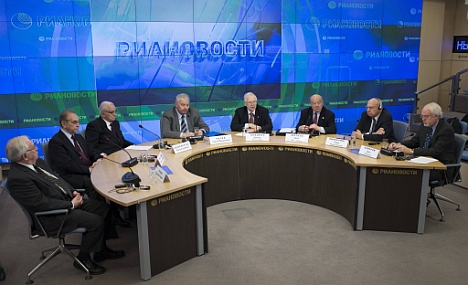
U.S. and Russian ambassadors come together at the meeting at RIA Novosti in Moscow on April 2. Pictured (L-R): Former Russian ambassador to U.S. Vladimir Lukin, former Soviet ambassador to U.S. Alexander Bessmertnykh, former Russian ambassador to U.S.Viktor Komplektov, director of Institute of USA and Canada Sergei Rogov, former U.S. Ambassadors to Russia James Collins, Jack Matlock, Thomas Pickering, John Beyrle. Source: AP
Former and current ambassadors to Russia and the United States met in Moscow this week to commemorate – perhaps rather than celebrate – the 80th anniversary of the restoration of diplomatic ties between the two countries. The group also tried to find strategies for ending the current cold spell in bilateral relations. RBTH asked five of the diplomats where to go from here.
Each ambassador was asked the following two questions: A famous saying from the Cuban Missile Crisis of 1962 was that “If the world ever comes to the brink of war, Americans and Russians will always come to an understanding.” How relevant is this today? And what advice do you have for the current ambassadors to Moscow and Washington?
Sergei Kislyak, current Russian Ambassador to the U.S., since 2008:
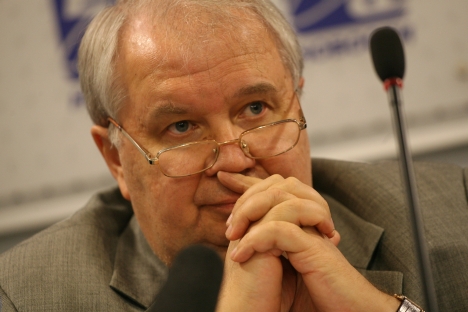
Sergei Kislyak, Russian Ambassador to the U.S. Source: Rossiyskaya Gazeta / Arkady Kolybalov
There’s no smell of gunpowder, except for regional conflicts on which we are working. I really hope this work will become more productive because it’s neither in our, nor in the Americans’ interest to see big explosions in regional conflicts, to say nothing of global ones.
Alexander Bessmertnykh, consul to the United States (1970-1983) Ambassador to the U.S., 1990-91:
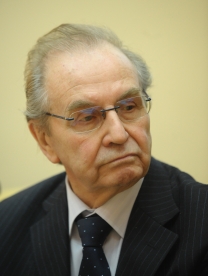 |
| Alexander Bessmertnykh. Source: Rossiyskaya Gazeta / Stanislav Krasilnikov |
How relevant is this? It is relevant. We are talking, and that is halfway toward coming to an agreement. …A lot depends on how the new administration will be able to see U.S.-Russia relations as critically important in current affairs. Overall it’s a normal state of affairs – our relations were never free of problems. The current level of disagreements arouses disappointment but not a genuine feeling of worry for our relations.
Ambassadors to both Moscow and Washington have proven themselves intelligent and successful in the past decades because, with some exceptions, experienced diplomats with a thorough understanding of their new country get appointed to those positions.
That’s the feeling I’ve come away with from the meeting with Foreign Minister Sergei Lavrov: Ambassadors and the Ministry of Foreign Affairs are working in unison.
I’d suggest current ambassadors don’t try to sugarcoat or ignore difficult parts of the relationship. When difficulties arise, they should address them from the start and not put them off until tomorrow because they can pile up and become more difficult to resolve. This is important because regardless of how the balance of power changes, our embassy in Washington remains one of the most important foreign posts (if not the most important one).
Victor Komplektov, Soviet and Russian Ambassador to Washington 1991-92:
I would put it another way. Currently relations between the U.S. and Russia – including in the field of security – is such that both sides practically exclude the possibility of any large-scale military conflicts with their involvement.
They should understand the domestic political situation in each country very well as well as its legal base. Most importantly – Russian-American relations encapsulate the entire world to a degree. So ambassadors need to keep track of everything happening in the world, especially in conflict zones, and inform their respective governments on how they can respond.
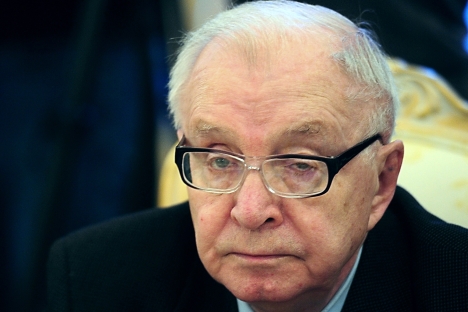
Victor Komplektov, Soviet and Russian Ambassador to Washington 1991-92. Source: ITAR-TASS
{***U.S. Ambasadors to Russia: James Collins and Alexander Vershbow***}
James Collins, U.S. Ambassador to Moscow 1997-2001:
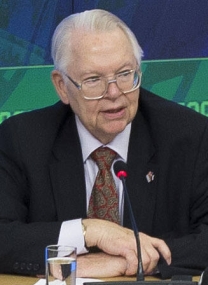 |
| James Collins, U.S. Ambassador to Moscow 1997-2001. Source: AP |
The spirit of the Cold War and the nuclear age – which we still live in – is very different today from what it was in 1962.
The ideological struggle is gone – there isn’t any competition now between systems. We almost had a clash of two religions (both secular). That wasn’t healthy. But on the other hand, you always had an understanding of the stakes and the importance of managing relations in a way that never allowed them to get to anything close to something like the Cuban Missile Crisis. As long as we were the two that had charge of it, it was manageable.
There are two aspects to what goes on between us.
First, we will continue to pursue reductions in these weapons. There are always long negotiations involved, there’s theater, but we know we don’t need the number of weapons in existence and they’re expensive to maintain. How low, in what conditions – they’ll discuss this. The other side of this is that we also have a great understanding of how we manage this issue between us. We know you don’t get to the idea of using nuclear weapons.
The challenge now is that there are a lot of people around – Indians, Pakistanis, Chinese we’re not sure about – we’re not sure will know how to manage this so they’re not used. There’s always a sneaking fear that some people will think ‘this is just a big rifle’ without understanding that it’s not.
I think therefore our problems are much greater than they used to be. It’s not just the two of us – left to ourselves, we could manage pretty well – but how do we manage these third parties and bring them into this management system? So the world’s become much more complicated in the last two decades. We’re still working on sorting that out.
As ambassador, I had three jobs I had to do well.
The first was to represent my government to Russian government. You had to carry out your instructions, but explain what was going on. You were an interpreter. You had to make clear what was often not very clear from just some words out of Washington.
I also had to represent our government to the Russian people. I had to give them as good an understanding I could as to what America was doing, not doing, saying, not saying, what it stood for, didn’t stand for…I didn’t see this as propaganda. You basically had to be honest with the Russian people.
The second was to be what I called the CEO of the U.S.A., Inc. Russia Division. Our government was spending a huge amount of taxpayer dollars here: We were building a space station, the Nunn-Lugar program was working to secure nuclear materials and weapons, we were engaged in a variety of programs ministries and others wanted advice on.I had to oversee that. So it was a big management job.
My biggest challenge was getting these things done in a way that was consistent with what Russia was interested in having accomplished. I never believed it was our business to tell Russians what they wanted.
And the third task was to explain to Washington what was going on here, what the views of their government were, what was behind them, how should Washington understand what was happening in the country that was in great flux and change. We were the only ones here on a regular basis. Others would come for a day or week and meet some people and go home.
I was here through some difficult times. I was here for the financial collapse of 1998 (when the American Embassy’s reporting and analysis was the best thing the U.S. government had). I was here during the Balkan Wars, the bombing of Serbia – we weren’t very popular. But I had to make clear what Russia was thinking and what its position was and also the other way.
So you represent, you manage and you explain. Any ambassador does this.
Alexander Vershbow, U.S. Ambassador to Moscow 2001-2005:
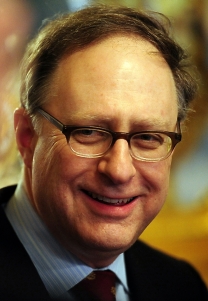 |
| Alexander Vershbow, U.S. Ambassador to Moscow 2001-2005. Source: Rossiyskaya Gazeta |
The idea that Russia and America “will always come to an understanding” is still very relevant even though the international environment is changing and there are more centers of power. We have to accept that it’s a multi-polar world.
The U.S. and Russia still posses very unique characteristics and responsibilities as permanent members of the U.N. Security Council, as the two largest nuclear powers, but also countries that span entire continents (in Russia’s case – two continents).
Therefore we have a global perspective that perhaps other major powers don’t. It doesn’t always work out, but we should be able in future crises to come together for the sake of peace and stability in the international community.
I think American ambassadors have a difficult role to play in being both boosters of cooperation, especially theses days in the business field (which will hopefully become more and more the centerpiece of the relationship), and to explain – sometimes very frankly – the political issues that create the disputes in our relationship.
They are oftentimes driven by domestic politics. They’re also frequently the function of our values and our national identity. It’s always a delicate balance to be both the advocate (the person who puts the accent on the positive) and the person who delivers the less pleasant messages from time to time.
Ambassadors need to be ready to play both roles, and I hope Russians understand the tightrope that American ambassadors have to walk.
All rights reserved by Rossiyskaya Gazeta.
Subscribe
to our newsletter!
Get the week's best stories straight to your inbox